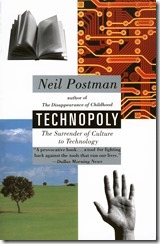 Are we using electronics or are they using us? That is the fundamental question that Neil Postman asks in Technopoly. Postman wrote this book in 1992. Long before the smartphone and even a few years before widespread use of the internet. This makes his assessment of the direction of our culture all the more prescient.
Are we using electronics or are they using us? That is the fundamental question that Neil Postman asks in Technopoly. Postman wrote this book in 1992. Long before the smartphone and even a few years before widespread use of the internet. This makes his assessment of the direction of our culture all the more prescient.
Postman decried our move from a society that used tools into one that is now shaped by tools. He called this a technopoly—“a self-justifying, self-perpetuating system wherein technology of every kind is cheerfully granted sovereignty over social institutions and national life.”
What Postman saw was a collapse of significant cultural symbols, bowing to the idol of this technopoly. Technopoly is not simply about technology it is about the way in which we rely upon these tools. It is the unblushing allegiance that we give to “scientific facts”.
Long before Google, Postman saw our dependence upon the machine to define reality for us. Something is true now because Google says it is true. (Consider here and here).
This ideology is not neutral. It aims to take no prisoners and bring about the surrender of our culture. Postman devotes an entire chapter to showing the path which leads to losing important cultural symbols. He notes that they are often trivialized instead of directly blasphemed.
So what is the answer? Postman gives a list of characteristics of those who “resist the American Technopoloy”. They are people who:
- pay no attention to a poll unless they know what questions were asked, and why
- refuse to accept efficiency as the pre-eminent goal of human relations
- have freed themselves from the belief in the magical powers of numbers, do not regard calculation as an adequate substitute for judgment, or precision as a synonym for truth
- refuse to allow psychology or any ‘social science’ to preempt the language and thought of common sense
- are, at least, suspicious of the idea of progress, and who do not confuse information with understanding
- do not regard the aged as irrelevant
- take seriously the meaning of family loyalty and honor, and who, when they ‘reach out and touch someone’, expect that person to be in the room
- take take great narratives of religion seriously and who do not believe that science is the only system of thought capable of producing truth
- know the difference between the sacred and the profane, and who do not wink at tradition for modernity’s sake
- admire technological ingenuity but do not think it represents the highest possible form of human achievement.
Postman says that we must understand
“that technology must never be accepted as part of the natural order of things, that every technology…carries with it a program, an agenda, and a philosophy that may or may not be life-enhancing and that therefore requires scrutiny, criticism, and control.” (Postman, 185)
I am intrigued by Postman’s ideas here. I think in many places he is spot on and he clearly saw the dangers that were awaiting us. Is it to late to fight the Technopoly? I would say it is already well upon us and the governing ideology of our day.


